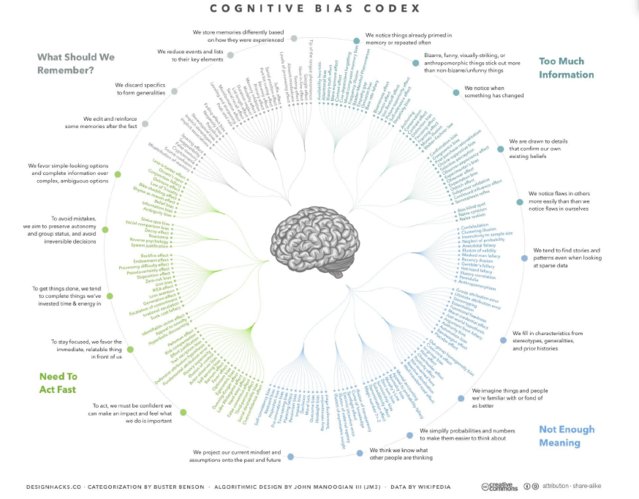KEY POINTS
- Magic tricks exploit cognitive biases, such as your brain's tendency to oversimplify complex information.
- Evolutionary psychologists assert that such biases evolved because they helped our ancestors survive, by making fast decisions.
- Magicians, know that our brains unconsciously "see" only what they expect to see and not what they don't expect see.
- Thus, almost all magicians (and con artists) carefully set up your expectations to perceive only what they want you to perceive.
Pick a card, any card from this set. Now close your eyes and repeat the name of the card you have just chosen 10 times, so you’ll remember it later.

Source: Image Illustrated by Eric Haselting
Also, by saying the name of the card out loud 10 times, the psychic vibrations from your thoughts as you say the card’s name will radiate out from where you are now, out to Southern California where my brain will pick them up, and allow me, by the time you finish this post, to tell you precisely which card you picked.
Oh, and one more thing, if you scan ahead to the end of the post, the magic will be forever lost and the trick will not work. As with all magic, you, the audience, must be a willing participant. Instead of skipping to the bottom of the page, close your eyes and repeat the name of the card 10 more times for good measure.
The reason that you must go along with the magic act is that magic does not live outside of you, say in a magician's wand, but inside of you, in the recesses of your own brain.
This “codex” of cognitive biases shows what I mean.

Source: CC0 Design Hacks Co, Buster Benson, John Manoogian
This chart (you don’t need to read the fine print to get the point) sums up many different ways our brains have evolved to cope with a complex, dangerous world, in which our distant ancestors (whose brains were identical to ours) had to quickly process masses of information to act quickly (say, to decide to run from an animal or to fight it and eat it).
The codex sorts cognitive biases into four broad problems that our ancestor’s brains had to solve: focusing on the right details amongst too much information, knowing which of those details to remember for later situations, finding meaning in those memories, and acting fast when the need arises.
Solving these ever-present problems requires our brains to make tradeoffs. For example, speed of action necessarily sacrifices some accuracy, as the need for fast action does not allow time to ponder all of the information we are presented. Thus, our brains have a cognitive bias to simplify complex situations to allow us to act swiftly.
Here’s an example of that bias in action.
Quickly now, count the F’s in this sentence
Finished Files Are the Result of Years of Scientific Study
Combined With the Experience of Years
Most people come up with three F’s, instead of the six actually there, because they ignore the three of’s.
If you missed the of’s you are in good company because most other people, like you, have learned that linguistic meaning seldom lives in of’s allowing that humble word to be passed over in favor of more meaning-filled words.
And right there, is an example of magic at work: the brain focusing on what it expects to be meaningful while automatically and unconsciously discarding what it expects has no meaning.
All good magicians know this, taking advantage of your built-in expectations, and carefully laying out a sequence of events to keep your brain from deviating from the path down which they wish to take it.
For instance, a stage magician may proclaim that he intends to saw his assistant in half (setting up an expectation in your brain). Then, reinforcing this expectation, he beckons his assistant to climb inside a long box (even further reinforcing his narrative and taking your brains down the garden path, as it were). Finally, making good on his promise, he saws through the middle of the box and separates the two halves, showing a top half and bottom half both presumably still alive. It’s magic.
Except that the magician had two assistants, one who curled herself up into the front box with her head poking out the front end, and a second, wearing the same stockings and shoes as the first, curled up into a second box with her feet poking out the back of the box, so that, what your brain perceived as one woman cut in half (because that’s what it expected to see) was actually two women crammed into two half boxes.
There you have it. Magic works because your brain oversimplifies the world, seeing what it expects while blinding itself to what it doesn’t expect.
Although our brains’ cognitive biases are the foundation of all fun magic shows, they also have a serious side. For instance, con artists also know how to exploit your expectations (and desires) to lead your brain down a garden path, robbing you of your savings.
Speaking of con artists, let’s see if I have conned you into believing psychic vibrations from your repeating the name of a card 20 times somehow traveled through the ether into my brain, allowing me, magically, to divine which card you selected.
Ready? Here we go.
Look at the original set of cards I showed, you. The one you selected is missing, isn’t it?

Your card is missing
Source: Image Illustrated by Eric Haseltine
How to heck did I do that?
Magic!
Now, if the trick didn’t work (sometimes it doesn’t), sorry to disappoint.
But if it did work, you can find out how by carefully re-reading this post. All the answers are there—if only you can stop your brain, in its never-ending quest for simplicity, from overlooking them.











